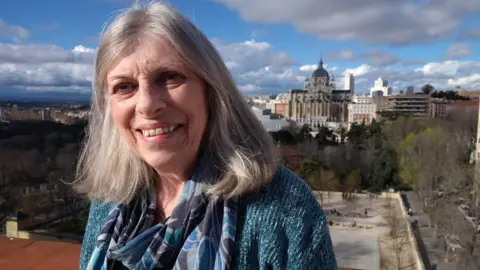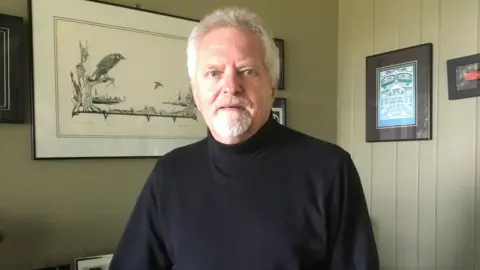ARTICLE AD BOX
15 minutes ago
By Yazmina García, BBC News Digital Special Projects Team

 handout
handout
Valerie Stacey has been living in Madrid for more than 40 years
Around two million British citizens who have been living abroad for more than 15 years can now vote in UK general elections, following a rule change by the Conservative government. BBC News asked four expats if they will cast their ballots.
“I deserve to have a say in what's going on,” 76-year-old Valerie Stacey says from her home in central Madrid.
The former English teacher is one of the 100,000 British citizens based overseas for more than 15 years who have already applied to vote following the change in rules.
To qualify, Britons must have previously been registered to vote in the UK, or have been resident there. They can apply online to vote by post, by proxy, or in person if they are in the country on 4 July.
Although she has lived in Spain since the early 1980s, Valerie has strong views on the NHS and social care in the UK. In the upcoming general election, she will cast a postal vote in the Manchester constituency she lived in before she emigrated.
Through her work introducing Spaniards to British culture, Valerie says she has always felt like an “ambassador” for the UK.
“Some people have the impression that those of us that live outside the UK, we've sort of turned our backs on our country, which isn't true.
"I still feel very British."
It’s a feeling shared by 72-year-old Ian Andexer, a retired hotel manager who has been living in Canada since the 1970s.
“Britain is my home,” he says. “They all say, ‘Ian, you never let go.’ "
Even after almost five decades abroad, Ian takes a keen interest in UK government policy because of concerns about his pension.
He has spent 20 years campaigning for the UK government to improve state pensions for British citizens who moved abroad. Some countries, like Canada, do not have a financial agreement with the UK that allows for annual increases to the UK state pension.

 handout
handout
Ian Andexer is encouraging other overseas pensioners to register
This policy affects around half a million pensioners abroad. The Department of Work and Pensions says it will increase the value of state pensions overseas “where there is a legal requirement to do so.”
But Ian recognises that others may not be as eager as he is to participate in an election thousands of miles away.
'It's not fair that I have a say'
Jim Arrowsmith in eastern Australia has no interest in casting his ballot. Jim made the grassland plains between Northern Victoria and New South Wales his home following a backpacking holiday in 2006, and despite taking a keen interest in British politics, does not intend to return to the UK.
“I don't think it's fair for me to be sitting the other side of the world having a say in a vote that's not going to affect me,” the 40-year-old pork products supplier explains.
“If I saw something that I had to vote for, some sort of major democratic change, I probably would register.
"But at the moment I don't think that it would be fair for me to do so.”

 handout
handout
Jim will not vote in the next election
The Labour Party expressed a similar view when it objected to the change in 2022. It argued that 15 years was a “reasonable and proportionate amount of time for someone to retain a vote” and said the rule change would make it easier for wealthy donors who have not lived in the UK for decades to contribute.
The Conservative government said that British citizens overseas retain deep ties to their country, and are affected by policy decisions in areas like immigration, defence or pensions.
Others, like Belgium-based Daniel Allingham feel conflicted about having a right to vote in an election which will not directly impact them.
Originally from Romford, the 45-year-old finance professional became a Belgian citizen in 2022 and is settled with his family in Ghent. However, he says he still believes he should cast his UK vote out of a sense of duty.
"I feel a moral obligation to," he says from his home office. “I'm aware of what people went through in the past to defend the right to vote."
“I'm pretty lucky... This year I'll vote in two countries.”

 handout
handout
Daniel was one of the first ones to re-register
While there are many reasons why overseas citizens may or may not decide to cast their vote, the impact of this voting group on the outcome of the election will be hard to measure.
Dr Matthew Barnfield, a postdoctoral research fellow at Queen Mary, University of London says there is little polling data available for expat voters. The vast majority are still not registered, he says, and even registered voters may not be able to cast their votes because of administrative difficulties like ballots not arriving on time.
For Dr Barnfield, the number of votes cast by overseas citizens is not likely to be significant. Paul Webb, Professor of Politics at the University of Sussex agrees.
“They are likely to be too dispersed across 650 constituencies to make a difference to the outcome,” he says.



 10 months ago
37
10 months ago
37








 English (US) ·
English (US) ·